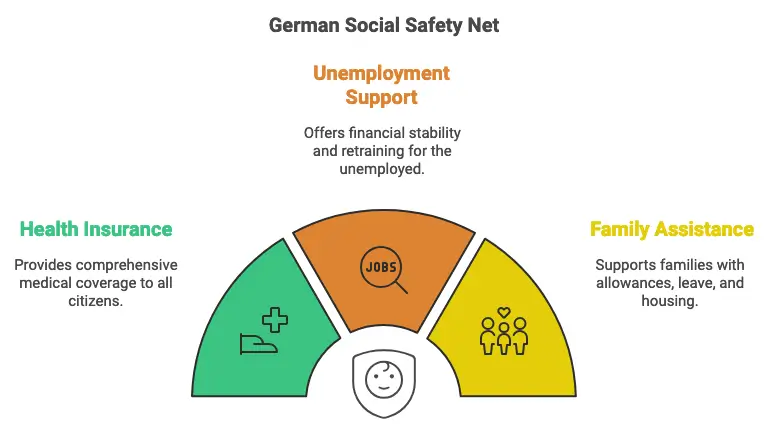Germany stands out globally for its robust social welfare system, offering comprehensive support to its citizens through various state-sponsored programs. Social benefits for German citizens represent a intricate network of financial assistance, healthcare, and social protection designed to ensure a high quality of life for residents.
The Evolving Fabric of Citizen Welfare
Recent changes in German citizenship law have expanded opportunities for individuals seeking to become part of the German social system. These modifications reflect Germany’s commitment to inclusivity and social support, making social benefits for German citizens more accessible than ever before.
Mapping the Social Safety Net

Citizens can access a wide range of state-sponsored support mechanisms:
- Health Insurance Coverage
Comprehensive medical protection ensures that every German citizen receives high-quality healthcare without excessive financial burden. The public health insurance system covers most medical treatments, preventive care, and essential medications. - Unemployment Support
The German unemployment benefit system provides financial stability for citizens facing job loss. Individuals can receive:
- Unemployment money (Arbeitslosengeld I)
- Basic security benefits (Arbeitslosengeld II = currently replaced by Bürgergeld)
- Professional retraining programs
- Job placement assistance
- Family-Oriented Assistance
German social benefits extend significant support to families:
- Child allowance (Kindergeld)
- Parental leave benefits
- Housing support for families
- Educational grants for children
Financial Protections for Every Life Stage
Youth and Education Support
Young German citizens benefit from:
- Free public education
- Vocational training programs
- Student financial assistance
- Apprenticeship opportunities
Senior Citizen Welfare
Elderly individuals receive comprehensive support through:
- Retirement pension systems
- Healthcare coverage
- Long-term care insurance
- Social integration programs
Recent Legal Transformations
The new German citizenship law has significantly expanded opportunities for social integration. Key changes include:
- Simplified naturalization processes
- Reduced residency requirements
- Increased pathways to permanent citizenship
- Enhanced recognition of international qualifications
Financial Protection Mechanisms
Social benefits for German citizens extend beyond immediate monetary support. They create a comprehensive safety net that:
- Prevents poverty
- Supports social mobility
- Ensures minimum living standards
- Promotes economic stability
Navigating Bureaucratic Processes
Citizens can access social benefits through:
- Local government offices
- Online application platforms
- Dedicated social welfare centers
- Municipal citizen service points
Important Documentation
Individuals must prepare:
- Valid identification
- Proof of residence
- Income statements
- Personal tax information
Technological Advancements in Welfare
Digital platforms now streamline benefit applications:
- Online submission systems
- Mobile application tracking
- Instant verification processes
- Transparent communication channels
Inclusive Support Framework
Germany’s social benefits system prioritizes:
- Equal access for all citizens
- Non-discriminatory support mechanisms
- Comprehensive coverage across demographic groups
- Adaptable assistance programs
Emerging Trends
The social benefits landscape continually evolves, with recent focuses on:
- Digital transformation
- Sustainable support models
- Personalized assistance programs
- Integration of immigrant populations
By maintaining a robust and flexible social welfare system, Germany demonstrates its commitment to citizen well-being. Social benefits for German citizens represent more than financial support—they embody a national philosophy of collective responsibility and individual dignity.




